Doctor Who isn't dead, it's pining for the fjords?
I still haven't heard if the rumors of Jodie Whittaker and Chris Chibnall leaving are just that--rumors--or if it's the true story. But then, I don't follow the news and rumor mills religiously, either. Anyone? But if this was one of the final episodes for the current regime to go out on, it was a good one.
Or alternately, it played around with a lot of "big" ideas and it was over most people's heads, and gosh-darn it we just want creepy monsters and technobabble, and give us back Peter Capaldi and Matt Smith. Waahhh.
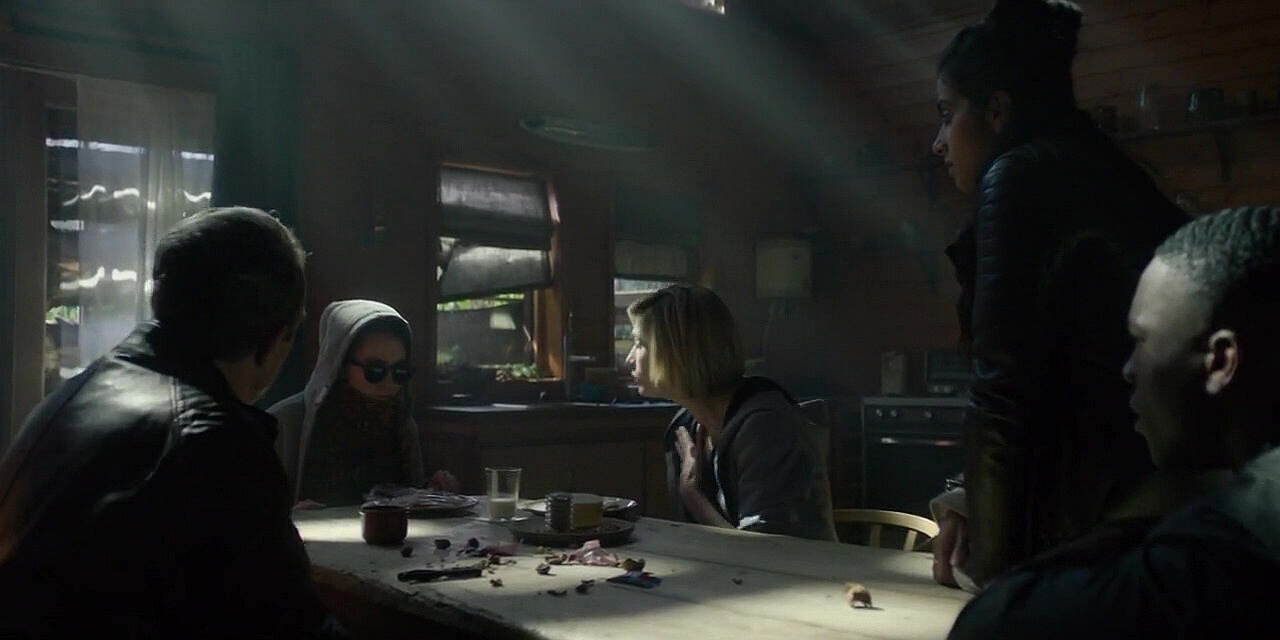
So what does "It Takes You Away" all mean? We start in an isolated part of Norway that could be anywhere: other than some Scandinavian accents from the guest stars, it could be an isolated cottage in the UK or the States or Mexico. The point is that something is roaring away in the woods, and the only person in the isolated cottage is a blind girl, Hanne (Ellie Wallwork). Her father has disappeared and Hanne doesn't dare go out because a) she's blind and b) the roaring in the woods.
Team TARDIS soon finds a mirror that acts as a portal to a misty void, inhabited by a creepy alien named Ribbons (Kevin Eldon). Ribbons thinks with his stomach, and offers to guide the Doctor, Graham, and Yasmin through the maze. However, there are also Flesh Moths, which attack anything that moves and strips the flesh from its bones. They would be more impressive if we could see what the heck is going on. But most of the stuff in this region called the "Antizone" is dimly lit. Maybe the vaguely-seen terror of the Flesh Moth makes things scarier for some people. Sadly, I'm not one of them. Or even three of them.
Ryan stays behind with Hanne, and she doesn't like him. He eventually finds out the roarings are recordings, and that Hanne's father Erik (Chistian Rebeck) set them up to keep Hanne at home. Hanne knocks Ryan out and goes through the mirror.
Meanwhile, the Doctor and her companions have found another exit out of the Antizone. The other side looks like Hanne's house, and Erik is there. So is Erik's dead wife Trine (Lisa Stokke). So is the dead Grace (Sharon D. Clarke), Graham's wife and Ryan's grandmother.
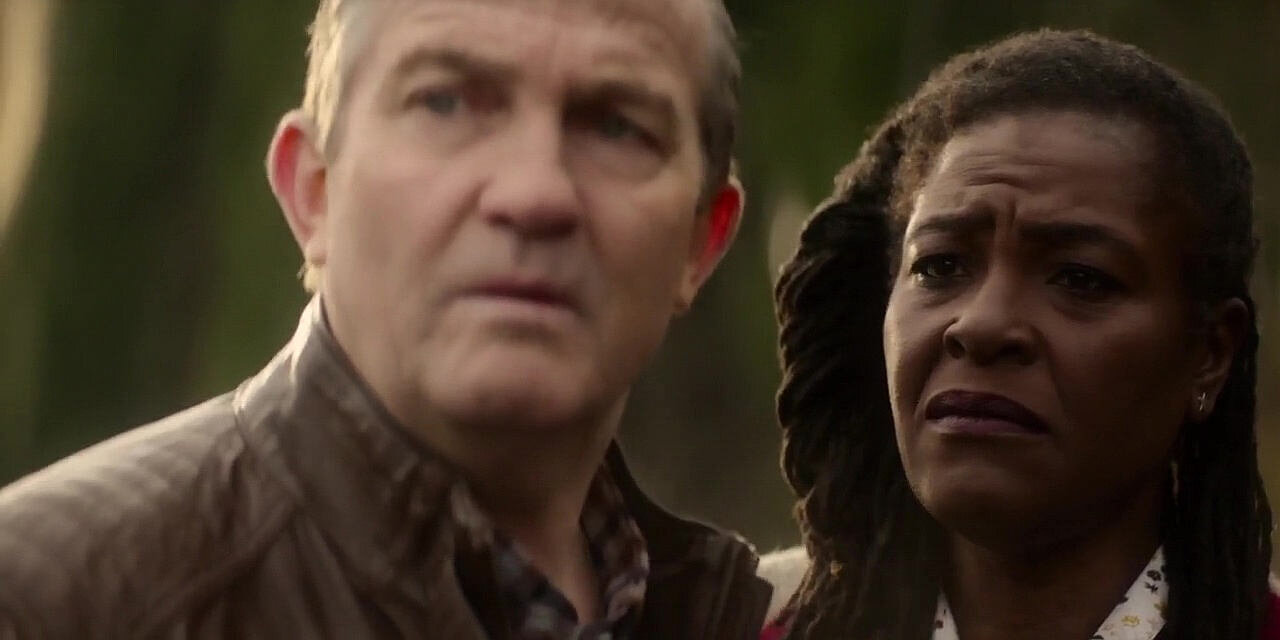
Thanks to the Doctor remembering an old Gallifreyan bedtime story told to her by her fifth grandmother, she eventually remembers the story of the Solitract, a consciousness from the beginning of the universe that can't fit into "our" reality without destroying it. The Solitract has created the mirror universe as a trap to gather friends and eventually somehow find its way into the baseline reality. "Trine" and "Grace" are just bait: simulacrums with all of the memories Erik and Graham, respectively, think that they would have.
The mirror universe starts falling apart. When Yasmin and Hanne object, "Grace" and "Trine" eject them out of the material universe. Graham has trouble letting go, but when "Grace" says Ryan will be fine, Graham realizes she's not real and gets rejected. The Doctor offers herself and her experiences in lieu of Erik, and "Trine" rejects him out as well as the mirror universe starts to crumble.
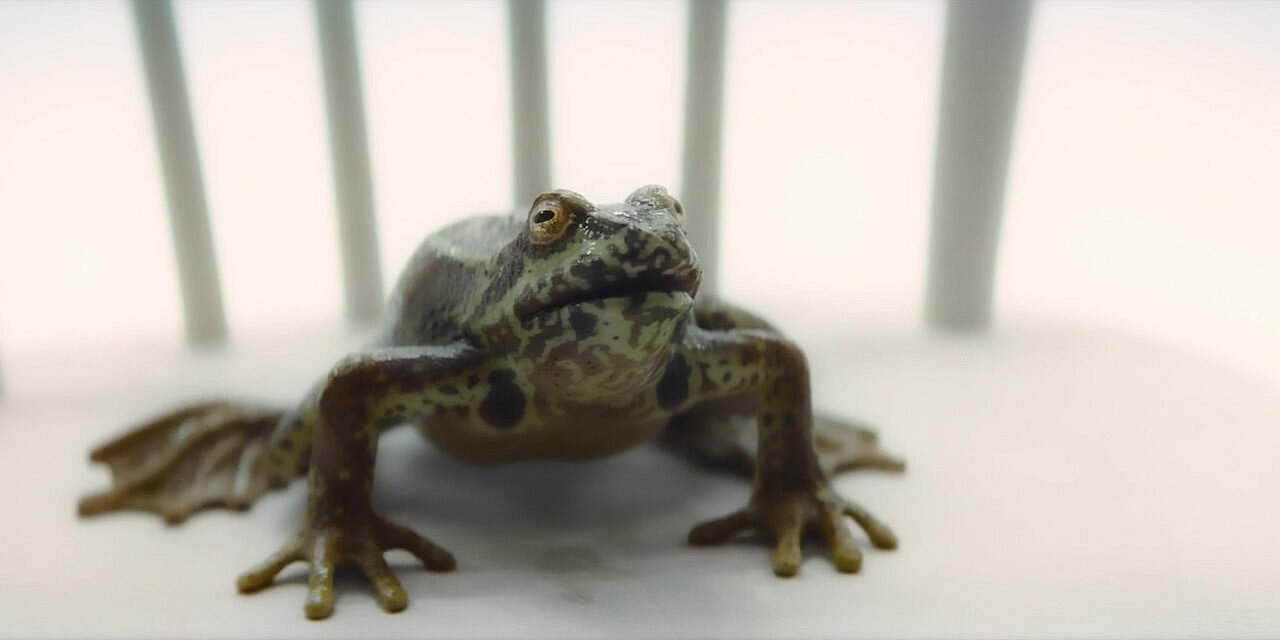
This leaves the Doctor in a white void, talking to the Solitract. Which has taken the form of a frog because Grace liked frogs. The Solitract just wants to have a friend, but its universe is still crumbling because of the Doctor's presence. She says she has to go but will always be the Solitract's friend, and it rejects her back into the Antizone. Everyone gets out into the real universe house as the Antizone collapses. Hanne and Erik decide to head back to civilization As they head back to the TARDIS, Ryan sympathizes with Graham and calls him "Granddad" for the first time. And that's it.
On the one hand, "It Takes You Away" is a touching emotional drama. It goes for the big concept with a whole other universe/consciousness that is incompatible with our reality. It's got another great performance by Bradley Walsh. It's bold! It's extra-bold! And that might be part of the problem. The concept is almost frighteningly large and incomprehensible... so they squeeze it down to a cottage in Norway.
As such, the Solitract comes down to a pretty simple "too good to be true" cliché. Even though the Trine and Grace simulacrums are convincing, we know they can't be. And because they're just limited to two people, and we know Graham is too smart to eventually fall for the ruse, we know it's all going to fall apart. Compare that to "Army of Ghosts", where we get a worldwide invasion of ghostly loved ones. It's like they said in the movie Men in Black. A person is smart. People are dumb. It's easier to buy that a large chunk of a worldwide population would be fooled, then just a couple of persons, one of whom we know pretty well.
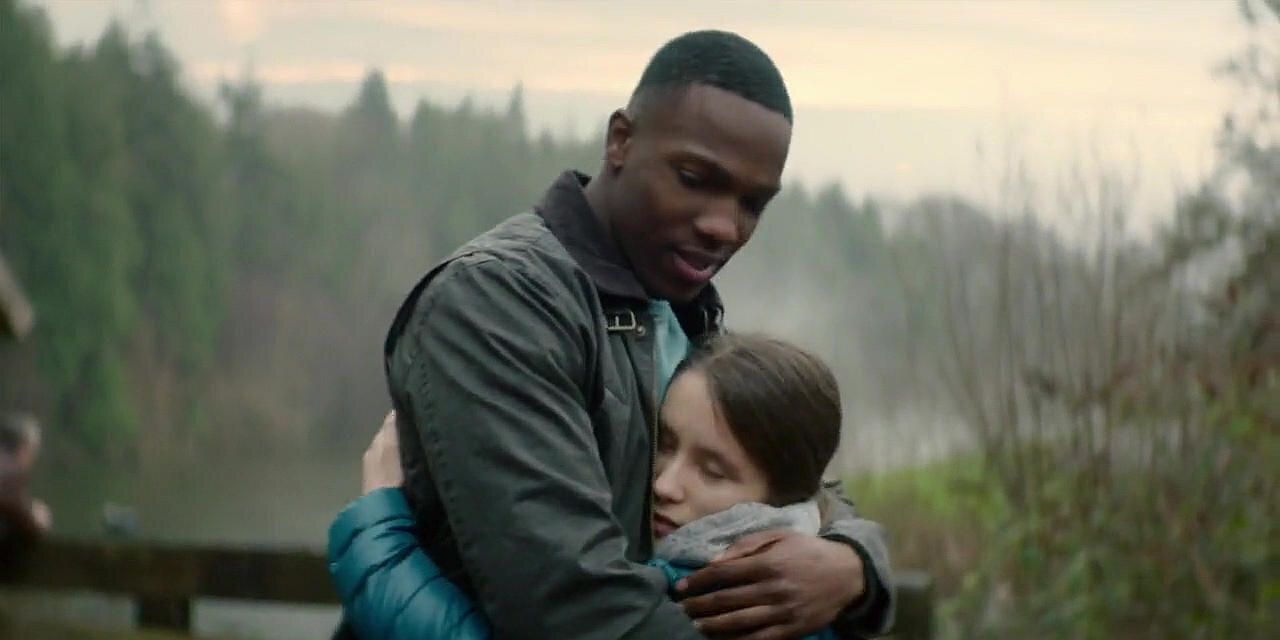
There's a fair amount packed away here about Graham and his grief for losing Grace. It makes me wish we'd known more of her before she died in her premiere episode; and that she was traveling with the Doctor rather than Yasmin. Speaking of Yasmin, she doesn't do much here. She gets a brief mention of her investigation training, but otherwise she pokes around and does companion stuff. Ryan, pretty much the same. The non-relationship between him and Hanne is interesting because she doesn't really like him. Usually the companions make buddies wherever they go: look at the recent "Kerblam!" for an example. But by the end of the episode, Hanne comes around and is hugging Ryan.
Jodie Whittaker is still very Doctorish. As I've said before and will say again, I hate to see her go if she is going. But I'm not sure the new kinder, gentler Chibnall-era Doctor Who is doing her any favors. Myself and others that I've read want a Doctor who stands up to evil and injustice and tyranny. Whittaker's Thirteen hasn't had the opportunity to really do that. All her bad guys are either conveniently nice like the Solitract. Or petty humans like in "Kerblam!" and "Arachnids in the UK". Or just misunderstood beasties following their nature like the Pting in "The Tsuranga Conundrum" and King James to some degree in "The Witchfinders". Or they're just poor-shooting, badly-armed dopes like in "Rosa".
I know it's "traditional" to put the Doctor up against the Daleks or the Cybermen early in his regeneration. I don't think it's necessarily because they're traditional monsters rather it's that they make a nice, evil presence for the Doctor to take a moral stand against. Thirteen's sympathies seems to be more with her opponents than against. The Morax, Tim Shaw, and the Remnants are the exceptions, and they've all been pretty easily disposed of at the end of the day. For the Doctor to stand out, she needs some enemies with... "gravitas", for lack of a better word. Heck, Eight faced off against the Nestenes. The Nestenes had only shown up twice before back in the 70s. But at least they had an... "evil" point of view, and were someone the Doctor could take a stance against. Nine had the Sycorax. Thirteen and the Remnants? Not so much.
So it's like Chibnall is setting out to undercut the Doctor. It's a Doctor for 2018, but it's a Doctor that is all regretful and understanding and remorseful. Those are qualities of the Doctor, but they're not the only qualities. But it's almost all we're getting in Series 11, so it seems like those are her main qualities. And those aren't the Doctor's.
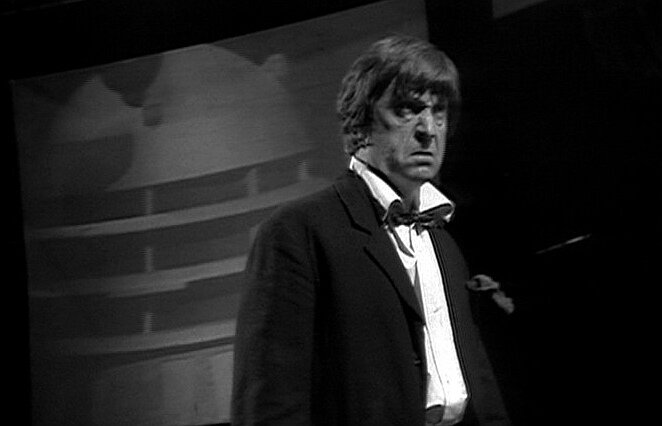
"All these evils I have fought, while you have done nothing but observe!"
It's hard to imagine Thirteen giving a speech like that. She seems to do nothing but observe much of the time, while giving the occasional "They're misunderstood" or "I want to be your friend" speech on the side. I don't want a Doctor that super-heroically fights evil each week. But I don't want one that never fights something substantially evil, either. Instead we get a Doctor who has a big showdown with a talking frog and agrees to be BFFs with it. All-righty.
But that's just my opinion, I could be wrong. And maybe it's better suited to an end-of-season review. Like I'll be doing when Series 11 ends next week after ten episodes. And then the Who Year's Eve Special. And then... whatever the future brings.
And will we ever find out who or what the Timeless Child is?
What do you think?
Written by Gislef on Dec 3, 2018

Great review Gislef !
I'm with LadyShelly on the no true shining episode for the season. Nothing stood out for me as exceptional.
What I've missed most is the absence of the "weight" that a Time Lord carries. Eccleston, Tennant and Smith all pulled it off based on the writing. That moment when you get to see the Doctor express doubt or knowledge that it's not gonna end well from the beginning.
I'm not looking for Time Lord tears, but Jodie Whittaker has a huge range and she can do anything the writers/director let her do.
So my comment is.. Jodie Whittaker is very cool but she is getting sub standard story opportunities to explore the character.
All the above.
I adore the Troughton era, lots of really great stories in that time (missing episodes notwithstanding).
Not sure how much of Davison's early problems were the same. I think a lot of his is perception of the "wet vet" mentality that it took a few stories for viewers to shake the image of Tristan. He had a crowded TARDIS, too, even after Earthshock, but the stories were still better written and the companions were loads better. Turlough had an interesting backstory, and even though I wanted to drop Tegan out the nearest airlock, at least she had some personality, unlike, say, Ryan.
No era is perfect, they all managed a few clangers (the less said about the end of Tom Baker's era the better), but this season has committed the terrible sin of being ... boring. Which interestingly enough is also the impression I have of a lot of Hartnell's era, too. His stories didn't improve until the Beeb dropped the whole "edu-tainment" idea and just told adventure stories.
Troughton is my favorite Doctor.
"and I think you put your finger on the reason why when you point out how Jodie's Doctor is missing that balance of heroic defender as well as compassionate believer. "
That's why I get paid the big bucks. :) But yep, that's my main gripe, and I think it all adds up. Thirteen isn't a heroic defender. And part of that is the inexplicable ban on Daleks and Cybermen: there's nothing for her to heroically defend against. Like they say, a hero is defined by their enemies. And the "enemies" this season have been weak. If Chibnall wants to ban the classics, fine. But then let him come up with some better ones: the equivalent of the Angels or the Silence. Tim Shaw was okay but he was a one-off despite mentioning the Stenza in the next episode.
It's not just the modern era. Davison's Doctor was a bit of a wet squib until "Earthshock".
Chibnall's lapse into Quantum Leap territory ("Rosa", "Demons of the Punjab") hasn't helped. "You can't change history" may be "realistic", and heck, it's how Doctor Who started off. And when they've done conflict over it, whether it was Barbara and the Aztecs, or Graham and taking Rosa's seat on the bus, it's been good. But "Time" is a pretty uninspired enemy, all things considered. And you can't heroically defend against Time.
I'll do a season summary as part of next week's review: I'll incorporate that all in.
'Everybody loves Hypnotoad!' phrase exhaustively describes this episode.
This was probably the best episode of the series in my mind, bad frog effect non-withstanding, though it still came out as just average Who for me. We have one episode left and this series just did not have any real stand-out, will be remembered for ages, stories. Sadly, the less said about most of them, the better, and I think you put your finger on the reason why when you point out how Jodie's Doctor is missing that balance of heroic defender as well as compassionate believer.
On different note, more Patrick Troughton!